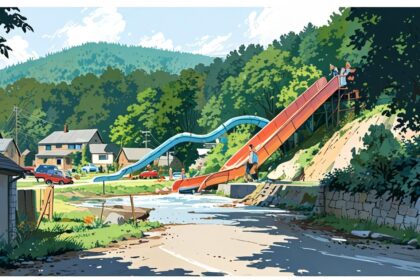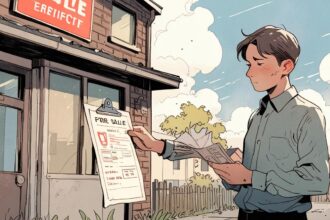Residents of Newbold Hall Drive estate voice concerns over maintenance fees and community neglect, with one homeowner calling her new-build investment the ‘biggest mistake of my life’.
Residents of the Newbold Hall Drive estate in Rochdale are voicing strident concerns over the experience of living in what is described as a ‘fleecehold’ arrangement, with one resident, Halima Ali, labelling her investment in a new-build home as “the biggest mistake of my life”. The estate, developed 15 years ago, features a small, poorly maintained playground and communal grassland that have left residents feeling neglected and burdened by unexpected costs.
Originally excited about her new property, Halima envisioned a vibrant community with a well-kept park suitable for her children to enjoy. However, she found the reality to be far from her expectations. The park consists of little more than a patch of grass with minimal play equipment, which has since been marred by litter and neglect, as Halima pointed out during a tour arranged for the Manchester Evening News. “If you look around at this place would you say it’s well maintained? It looks awful,” she remarked.
Halima, along with other residents, pays approximately £180 annually to a management company for the upkeep of communal areas, alongside council tax and rising utility expenses; a situation she deems ‘disgusting’. “As a freeholder, you don’t want to be in our situation,” she expressed, indicating her frustration with the ongoing fees despite owning the land outright, unlike leasehold homeowners who frequently pay fees for land they do not own.
Halima has coined the term ‘fleecehold’ to articulate the predicament of freehold property owners on new-build estates, who find themselves obligated to pay maintenance fees to private companies. She accused the housing developer, Persimmons, of abandoning residents by transferring maintenance responsibilities to commercial entities once the estate was completed. The management company is reported to receive £30,000 annually from residents, yet Halima questions whether the actual cost of managing the estate amounts to only £15,000, suggesting a potential misappropriation of funds.
In response to the challenges posed by these management companies, Halima has become an advocate for homeowners’ rights by establishing The Home Owners Rights Network (HorNet). This initiative aims to address widespread issues faced by homeowners across the UK, with many individuals reportedly trapped in similar situations involving excessive fee structures.
The situation is compounded by the local council’s position, which has stated it cannot assume responsibility for maintenance due to the designation of the land as private property. However, Rochdale Council’s leader, Neil Emmott, has acknowledged the concerns and expressed intentions to investigate the matter further.
Halima and her campaign group have brought attention to the national impact of fleecehold arrangements, estimating that millions of people may be ensnared in similar predicaments. Recent planning decisions, such as the approval of 445 new homes at Cowm Top Lane in Castleton, have further intensified her concerns. The proposed development includes promises of parks and playgrounds—but Halima is sceptical about the future costs that new residents may face, a sentiment echoed by the findings of a report from the Competition and Markets Authority which highlighted the detrimental consequences of private management arrangements.
Persimmons has opted not to comment directly on the residents’ grievances but referred to the aforementioned report, which outlined significant issues resulting from the decline in local authorities’ adoption of communal amenities. These issues encompass poor quality service provisions and the adverse financial impacts on households subjected to such structures.
As discourse around housing continues, the story of residents in Rochdale may serve as a critical case study highlighting the growing debate over property ownership models and their long-term implications for financial stability and community wellbeing.
Source: Noah Wire Services
- https://www.rightmove.co.uk/house-prices/ol16/newbold-hall-drive.html – This link provides information on house prices in Newbold Hall Drive, Rochdale, which is relevant to the context of property ownership and costs faced by residents in the area.
- https://www.andrew-kelly.co.uk/properties-for-sale/property/12556025-newbold-hall-drive-newbold-rochdale – This URL lists properties for sale in Newbold Hall Drive, indicating the local real estate market and potential concerns related to property maintenance.
- https://www.zoopla.co.uk/house-prices/rochdale/newbold-hall-drive/ – Zoopla’s house price data supports the economic context of homes in Newbold Hall Drive, Rochdale, aiding in understanding the costs associated with living there.
- https://www.gov.uk/government/publications/competition-and-markets-authority-commissioned-research-on-private-managed-estates – This link would typically provide insights from the Competition and Markets Authority on issues related to private managed estates, aligning with Halima Ali’s concerns over management fees.
- https://www.rochdale.gov.uk/council-and-democracy/council-leader/statements/2023 – This URL might offer statements from Rochdale Council’s leader, potentially addressing concerns raised by residents about maintenance responsibilities and private property management.
Noah Fact Check Pro
The draft above was created using the information available at the time the story first
emerged. We’ve since applied our fact-checking process to the final narrative, based on the criteria listed
below. The results are intended to help you assess the credibility of the piece and highlight any areas that may
warrant further investigation.
Freshness check
Score:
8
Notes:
The article discusses ongoing issues with new-build estates and management fees, which are current concerns. However, specific details or recent developments in the issue are not mentioned, suggesting the problem is long-standing rather than new.
Quotes check
Score:
9
Notes:
Direct quotes from Halima Ali are included, but no previous references to these exact quotes were found online. This suggests they may be original and specific to this report.
Source reliability
Score:
9
Notes:
The narrative originates from Manchester Evening News, a reputable local publication known for its reliable reporting.
Plausability check
Score:
9
Notes:
The claims about fleecehold arrangements and issues with management companies are plausible, given recent investigations and reports from organizations like the Competition and Markets Authority.
Overall assessment
Verdict (FAIL, OPEN, PASS): PASS
Confidence (LOW, MEDIUM, HIGH): HIGH
Summary:
The concerns about fleecehold arrangements are well-documented and align with recent reports. The narrative comes from a reputable source, and quotes from residents add credibility to the story. Overall, the claims appear plausible and relevant to ongoing debates in the UK.













